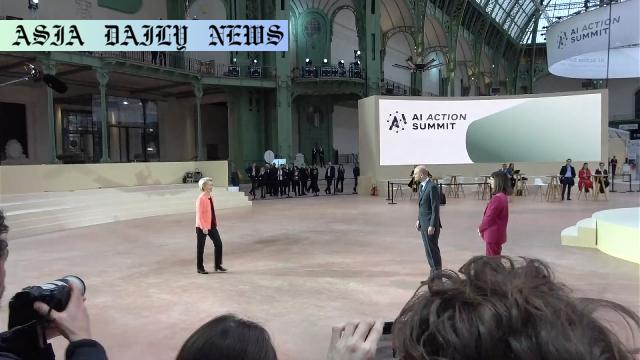AI Regulation: The Artificial Intelligence Action Summit in Paris outlined global gaps in regulating and advancing AI applications.
- The AI Action Summit statement emphasizes global disparities in AI regulation.
- Over 60 nations signed the inclusive AI declaration, excluding the US and UK.
- Emmanuel Macron stressed the importance of fair global access to AI technologies.

Introduction: Global Summit on Artificial Intelligence
The Artificial Intelligence Action Summit recently held in Paris brought together over 1,500 global leaders, including government officials, private sector representatives, and policy experts, to discuss the future of AI governance. With participation from high-profile leaders such as Indian Prime Minister Narendra Modi, US Vice President JD Vance, and Chinese Vice Premier Zhang Guoqing, the event underscored the urgent need to address the regulatory and development disparities surrounding AI technologies.
The summit culminated in the release of a joint Statement on Inclusive and Sustainable Artificial Intelligence for People and the Planet. The document underscored critical aspects such as ensuring AI remains ethical, transparent, safe, and inclusive. However, it also brought to light the significant divide between AI-leading nations and those lagging in development, sparking crucial debates and varied responses from participating countries.
Core Highlights of the Summit
A key takeaway from the two-day event was the clear discrepancy in how nations perceive the regulation and development of AI. While over 60 nations, including the European Union, Japan, and China, agreed to the declaration, major players such as the United States and the United Kingdom refrained from signing it. This decision highlighted broader disagreements regarding global AI governance.
US Vice President JD Vance expressed concerns over what he dubbed the ‘excessive regulation of AI,’ viewing it as a potential barrier to innovation and an indirect critique aimed at the European Union’s stringent AI policies. Meanwhile, the UK government cited the declaration’s lack of practical clarity on governance and national security risks as the primary reasons for its hesitancy.
French Leadership and Advocacy
French President Emmanuel Macron emerged as a staunch advocate for making AI accessible and inclusive on a global scale. Emphasizing the importance of these technologies as a shared global resource, Macron addressed the need to foster international collaboration while ensuring a level playing field.
His remarks resonated with the summit’s broader goals of reducing the gap between AI leaders and underperforming nations. By highlighting the necessity of democratizing AI access and expertise, Macron painted a vision of AI as a driver of equitable global progress rather than a tool of dependency or exploitation.
The Divide Between Nations
Nations leading the AI race, like China and the European Union countries, have reportedly implemented comprehensive, albeit differing, regulatory frameworks. On the other hand, emerging economies and underdeveloped nations face systemic challenges in achieving similar capabilities or governance sophistication.
Notably, the differences extend beyond economic capability, tying in with political ideologies and approaches to technology governance. For example, China’s heavily state-controlled AI ecosystem contrasts with the privatization-centric models common in the US and EU, creating divergences in how ethical considerations and security risks are tackled.
Ethical AI: Progress and Challenges
An overarching theme of the summit was cultivating the ethical development of AI systems. Ensuring transparency, mitigating biases, and safeguarding user privacy remain critical areas in focus. However, attendees acknowledged the difficulties of balancing these ideals with the accelerating pace of technological advancement.
The absence of two of the world’s leading tech nations, the US and UK, from the signees list raises pertinent questions about the statement’s efficacy and long-term impact. While the summit provided a platform to address these ethical concerns, achieving actionable global consensus remains an ongoing challenge.
Conclusion: Next Steps for AI Governance
As the world grapples with the implications of rapidly advancing AI technologies, summits like the one in Paris are instrumental in fostering dialogue and action. However, the divergent stances of key nations highlight the need for more inclusive and cohesive discussions. Bridging the regulatory and technological gaps will require sustained global cooperation, with a focus on making AI a tool for equitable progress.



Commentary
The Significance of Global AI Regulation
The Paris Action Summit on Artificial Intelligence serves as a pivotal moment for the global community to address both the opportunities and risks associated with rapid advancements in AI technologies. The gaps highlighted during the event underscore the pressing need for a unified approach to regulation, even as nations grapple with competing priorities and ideologies.
One key insight lies in the absence of the United States and the United Kingdom from the signees of the summit’s declaration. These nations, often regarded as leaders in the global tech space, appear to have reservations about sacrificing innovation at the altar of strict regulation. This hesitancy raises questions about their commitment to fostering AI that benefits people and the planet as a whole, rather than narrowly serving national or private interests.
A Call for Collaboration
French President Emmanuel Macron’s advocacy for fair access and the democratization of AI technologies offers a refreshing perspective in these highly polarized times. His statements remind us that AI’s potential lies not just in its innovation but in its ability to address global inequities and improve the quality of life worldwide.
That said, the path forward will not be simple. Effective AI governance must address multifaceted concerns, from ethical considerations and national security to global disparities in development. This summit was a step in the right direction, but achieving meaningful progress will require much more sustained dialogue and compromise.